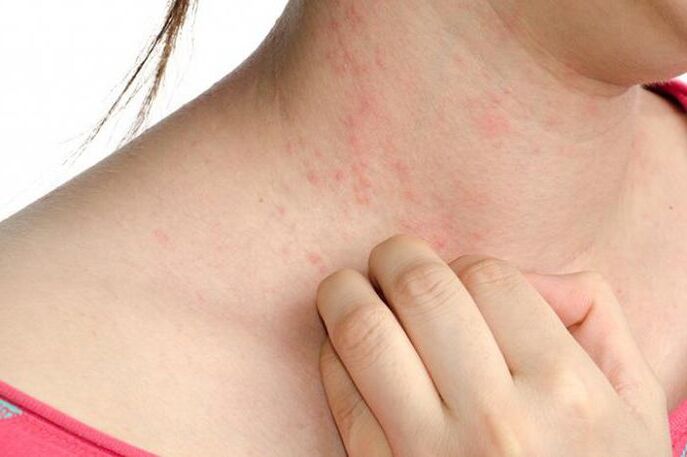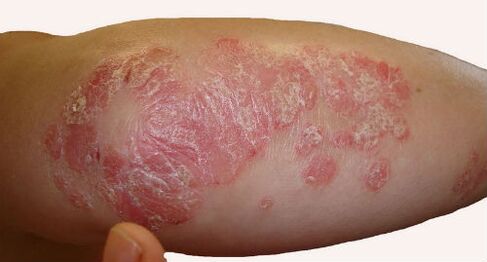
Psoriasis is a genetic disease for which there is no cure but is characterized by periods of remission and exacerbation. The pathology often causes severe itching, pain and excessive peeling of the skin. That's why it's so important to know how to relieve an exacerbation of psoriasis and ease your condition.
Signs of worsening psoriasis
Psoriasis relapse begins quickly and acutely. After a long period of remission, new rashes appear on the body. The areas of the body where the skin is driest are particularly affected: sacrum area, feet, palms, scalp. The patient's condition deteriorates sharply and the following signs appear:
- Formation of a terminal film at the site of the removed scales, especially in guttate psoriasis;
- Severe, sometimes unbearable itching;
- peeling and redness of the skin in the affected areas;
- Feeling of tension in the skin.
Papules that appear after remission with a red or pale pink hue have clear, rough edges. The rash gradually develops into plaques that can reach a diameter of more than 10 cm. The scales that cover the affected areas of skin peel off easily and blood may form underneath.
Best time for a relapse
The best time for psoriasis to worsen is the cold season (winter, autumn), when there are many viruses and bacteria circulating in the air. There are mutliple reasons for this:
- During the sunny season, the rays have a beneficial effect on the skin and the entire human body. A lack of vitamin D3 often leads to relapses.
- In winter, there is a decrease in immunity, which is a trigger for exacerbation of psoriasis.
At the same time, there is a possibility of exacerbation of psoriasis in summer. The reason for this is that too much ultraviolet radiation also has a negative effect on the skin, leading to inflammation and the formation of new plaques.
What causes an aggravation
To date, the reliable causes of exacerbation of psoriasis are unknown. What can lead to a relapse of pathology in some patients is absolutely safe for others. Let's name just a few factors that most often lead to the recurrence of psoriasis:
- Stress, chronic fatigue, constant emotional stress;
- Any damage to the skin, both mechanical and chemical;
- Failure to adhere to the recommended diet. A relapse is possible if the body lacks the necessary minerals and vitamins;
- Deterioration of human immunity due to the action of various factors;
- Abrupt climate change;
- Excessive alcohol consumption and even smoking;
- Hormonal imbalance caused by taking hormonal medications or thyroid dysfunction;
- Pregnancy, menstruation and menopause are conditions in which hormone levels in the body also change;
- The use of new cosmetics that can be applied directly to the skin areas affected by psoriasis worsens the course of the disease.
All of these are just the most obvious and common causes of exacerbation of psoriasis. In this case, a relapse can occur even after taking various simple and harmless medications. Given this, doctors recommend taking only those medications that are necessary for health reasons.

How to quickly relieve an aggravation
Since symptoms increase rapidly and sometimes become unbearable, how to quickly relieve exacerbation of psoriasis is the most pressing question. This is because the disease has severe and painful symptoms; the patient suffers not only from the appearance of spots, but also from severe itching. All of this worsens the quality of life.
People suffering from psoriasis note that the most effective remedies that can make life easier during this period are:
- Successive baths for larger lesions or lotions for small, small spots. Such solutions relieve itching but tighten the skin significantly. Accordingly, it is better to take them in combination with petroleum jelly or baby cream.
- Sodium salt and thiosulfuric acid in ampoules. The pharmaceutical preparation can be replaced with natural remedies such as prunes, senna grass, dried apricots or raisins.
- Baths with pine needles and valerian, which can be taken every 2 days. The proportions are as follows: for one bath, a bottle of valerian and 50 ml. pine needle extract.
- Lotions with emollient cream and a decoction of flax seeds. The product promotes rapid healing of cracks and is most effective for psoriasis on the palms or soles.
- Rub with vinegar (one tablespoon of vinegar per 0. 5 liters of water). Helps to quickly relieve itching.
All listed recipes help only in relieving acute symptoms, while conventional therapy is not an option as a treatment. If the disease recurs, you should contact a dermatologist who will prescribe treatment depending on the provoking factor.
The best way to relieve severe itching in case of a relapse
The most effective way to combat severe itching during a psoriasis relapse is medication. A 1-2% salicylic acid ointment in combination with local glucocorticosteroid medications has proven successful. In this case, care must be taken to properly care for the affected skin. The patient should take a bath and apply moisturizers to the affected areas.
The following drugs help eliminate severe itching:
- Antiallergic drugs that help relieve itching when the symptoms of psoriasis become unbearable.
- Ointments based on tar, salicylic acid, zinc oxide, a synthetic analogue of vitamin D - ointments that relieve inflammation and itching, soften and disinfect the skin. Apply to skin rashes 2-3 times a day.
Relieves inflammation and redness in psoriasis
In addition to systemic therapy, if psoriasis worsens, medications are also prescribed that help relieve the external manifestations of the disease. Ointments, creams, gels and gruels containing sulfur, tar, solid oil or salicylic acid help relieve inflammation and redness. The following drugs have proven effective:
- ointments based on naftalan oil;
- zinc oxide ointment;
- Salicylic acid based ointment;
- products containing tar;
- Solid oil products.
Such products have an antibacterial and antiseptic effect. They dry out the skin, accelerate the healing process of plaques and stimulate the peeling process.
If the relapse of the disease is very acute, the doctor may prescribe ointments with hormonal steroids to relieve inflammation. It is strictly forbidden to use such funds yourself, as they have many dire consequences.

How to relieve a head aggravation
An exacerbation of psoriasis on the scalp brings with it perhaps some of the most unpleasant symptoms. Here you cannot do without complex therapy, which includes:
- Taking medications for various purposes: non-steroidal drugs to relieve inflammation, immune system modulators, sedatives and anti-allergic drugs. It is also recommended to take vitamins B, A and D as part of vitamin complexes.
- Medications with local action help with itching and inflammation of the scalp. They have a strengthening, antibacterial and peeling effect. Ointments are applied to the affected areas of the scalp 2-3 times a day.
- Shampoos against psoriasis.
Before using any of the above remedies, you should consult a specialist. Truly effective therapy can be prescribed only if the factors that provoked the exacerbation are taken into account.
How to relieve exacerbation of psoriasis during pregnancy
Changes in hormone levels during pregnancy are a trigger for psoriasis to relapse. During an exacerbation, a woman suffers from severe intoxication and allergies. Red plaques form on the body that itch and hurt. The body temperature rises, the appetite disappears.
Exacerbation of psoriasis in pregnant women is a dangerous condition that threatens the health and even life of the child. Miscarriage, premature birth, premature birth - all of these are devastating consequences of such a disease for pregnant women. For this reason, at the first symptoms you should go to the hospital immediately and not self-medicate.
Treatment methods for exacerbations of psoriasis
Since the factors that caused psoriasis to worsen usually remain unknown, complex treatment is indicated. The use of only one remedy can alleviate the patient's condition, but cannot relieve him of all symptoms of relapse. Therefore, comprehensive therapy is used, which is intended to solve several problems:
- Stop the growth of plaques and restore skin;
- Eliminate provoking factors;
- Eliminate the possibility of the patient being in stressful situations.
- Cleanse the body and improve the functioning of the digestive tract.
The choice of methods and treatment regimen directly depends on the stage and form of the disease, the type and location of plaques, and the general condition of the patient.

Anti-relapse medication
In the fight against exacerbation of psoriasis, it is impossible to do without medication. The treatment regimen is selected individually and depends on many factors. However, as a rule, treatment consists of taking the following medications:
- Sedatives that have a calming effect on the nervous system. The most commonly prescribed tinctures are valerian and feverfew.
- Antihistamines.
- Tablets that improve the functioning of the digestive tract and cleanse the body: activated carbon.
Affected areas of the body are treated with topical medications. These include ointments and creams:
- Zinc and salicylic acid have a beneficial effect on damaged areas; such components should be included in the ointment;
- Solid oil based;
- With tar as the main ingredient;
- Sulfur ointment.
Since the patient's immunity is weakened during an exacerbation, the doctor may prescribe lipoic or folic acid, vitamin complexes or fish oil as additional treatment.
physical therapy
After the acute symptoms of the disease are relieved, the patient is prescribed physiotherapy. The following methods of influencing the body have proven to be the most effective:
- UF rays- promote rapid healing of damaged skin.
- Hydrotherapy.Baths with real Dead Sea salts help to cleanse the skin well.
- Cryotherapy- a method, the essence of which is the effect of low temperatures on the affected areas. In addition, it stimulates the immune system well.
- Selective phototherapy.During the procedure, the foci of inflammation are influenced impulsively.
- Shock wave therapypromotes rapid healing of the skin.
- Climate therapy.Patients are often recommended to undergo full treatment in seaside resorts.
How to relieve an exacerbation at home
You can relieve the most painful manifestations of psoriasis at home. The most commonly used recipes are those that have been tested over time and by hundreds of patients:
- butter and propolisin a ratio of 500 g to 50 g. All ingredients are placed in a saucepan and cooked over low heat, after the mixture has cooled, add 2 tablespoons of sea buckthorn oil. This ointment is applied to the skin 5-6 times a day. After just 6 sessions, people with psoriasis note that the manifestations of the disease practically disappear.
- Onion compresses.To prepare it, the onion is chopped into a paste, which is placed in gauze and applied to the affected areas. This method helps relieve inflammation and soften the skin.
Traditional methods
It often happens that you urgently need to stop an attack, but you don't have the necessary medications at hand. In these cases, lotions help a lot. To prepare you need:
- Mix calamus, string, licorice, burdock and nettle leaves in equal amounts.
- A large spoonful of this mixture is poured into a glass of water.
- The infusion is heated over low heat for five minutes and then left to infuse for another hour.
In the fight against the exacerbation of psoriasis, the following remedies have proven themselves:
- Birch tar ointment.To prepare it, you need to mix alcohol, natural sea buckthorn oil and birch tar in equal quantities. The product is applied to the affected areas, covered with polyethylene and left for 1-1. 5 hours.
- Celandine oil.5 tablespoons of chopped herbs should be poured with a glass of vegetable oil (unrefined) and kept over low heat for 5-10 minutes. The finished liquid is infused for 5 days and only then is used to treat psoriasis.

Anti-relapse diet
Compliance with dietary rules is an important and integral point in the treatment of psoriasis flare-ups. It is also important to take enough vitamins. To prevent the appearance of new plaques and eliminate unpleasant symptoms, it is strictly forbidden to:
- Foods rich in carbohydrates (fat milk and other dairy products, fatty meat and fish).
- Spicy, smoked, sour and salty foods.
- Marinades and pickles.
- Semi-finished products.
Dishes must be prepared by baking, steaming and boiling. It is better to eat vegetables and fruits, various cereals, and vegetable broths and soups.
Nutritionists and dermatologists recommend restricting your diet at the first symptoms of exacerbation of psoriasis. In the first three to five days you can drink sweetened tea or pure water in any quantity and also eat (a little) brown bread.
How to prevent exacerbation, preventive measures
If you follow relatively simple prevention rules, you can significantly increase the duration of remission and prevent an exacerbation. They all boil down to this:
- Skin care and hygiene rules.A psoriasis patient should take regular water treatments to avoid drying out the skin. Only cosmetic and hygiene products that have already been tested and have not caused any reactions may be used.
- Diet and proper nutrition.Not only harmful foods should be excluded from the diet, but also bad habits such as alcohol and smoking. Experienced specialists will help you put together the right menu.
- Moderate training.Fitness or swimming not only has a positive effect on the nervous system, but also helps to strengthen the immune system.
- Stick to a sleep schedule.Sleep should be at least 8 hours and it is recommended to avoid excessive stress at work.
- Taking lecithin in granular form.This drug improves skin condition and normalizes liver function. Doctors also recommend a drug based on birch mushroom extract and cobalt chloride, which strengthens immunity, restores hematopoiesis and improves the functioning of the digestive system.
By adhering to preventive measures, exacerbations of psoriasis can be forgotten for a long time. In addition, doctors advise avoiding stressful situations and supporting the body in the fight against psoriasis with vitamin complexes.

























